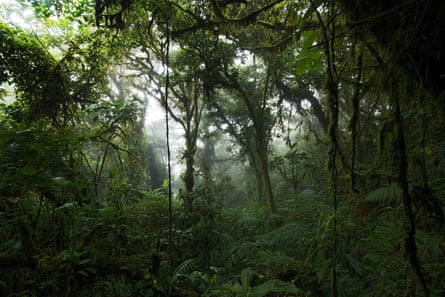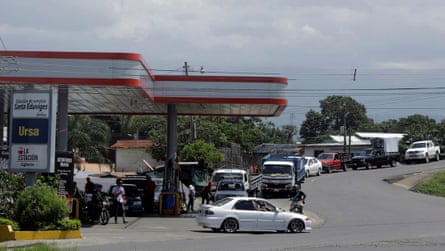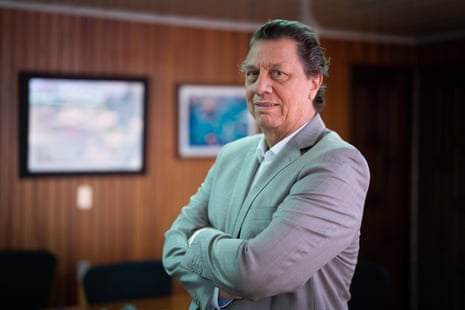“This country is what the world would like to be but is not,” says Franz Tattenbach, Costa Rica’s minister of environment and energy. The 69-year-old economist is keenly aware of his role as guardian of the country’s reputation for forward-looking biodiversity initiatives and forest restoration. Since the 1970s, successive governments have sought to do justice to its wildlife, enacting a widely praised conservation policy that has boosted the country’s image as a model of environmental preservation.
From his ninth-floor office window in San José, Tattenbach can see the mountains surrounding the Central Valley. Beyond them lie the jungles, the wild beaches and the areas where nearly 6% of the world’s biodiversity resides in just 51,100 sq km (19,700 sq miles) of land, and extensive marine protected area.
In 2019, Costa Rica received the UN’s highest environmental honour, the Champions of the Earth award, in recognition of its conservation efforts. Its forest cover then stood at more than 53% of the country, up from 40% in 1987, and it is home to a diverse range of species.
But Tattenbach is under pressure. Recently, environmentalists and NGOs have expressed increasing concern about the country’s ecological future. Since the president, Rodrigo Chaves, took office in 2022, there are signs that he is shifting the country’s focus from sustainability to economic growth, including going back to producing fossil fuels.
The same country that in 2021 considered a total ban on the exploitation of fossil fuels appears to have given up on phasing out oil and gas production and is now considering reintroducing drilling into its economy. To do so, the centre-right government could reverse a decree from the previous administration that ordered an oil and gas exploration moratorium, scheduled to last until 2050.
“For those who argue that gas extraction is inherently harmful to Mother Nature and cannot be conducted in an environmentally friendly manner, I have one word for them: Norway,” said Chaves last August, citing the European country as a model for investing in public services, pensions and infrastructure without raising taxes.
“We must carefully assess these resources,” Chaves added. “This is a multibillion-dollar industry, and as a nation we should discuss its potential.”
Speaking to the Guardian, Tattenbach agrees: “Decisions must be made considering the cost-benefit [of these activities].”
Tattenbach says the government faces a wave of lies, jealousy and ideological criticism from opposition parties, the press and environmental organisations, and that environmental preservation remains a priority. The difference, the minister says, is that Chaves is more focused on generating wellbeing for the people.

According to Tattenbach, Costa Rica’s new dilemma is maintaining its environmental reputation while generating wealth by “protecting more and obstructing less to private companies”.
During the UN’s Cop28 climate conference in December, Costa Rica declined to sign the Beyond Oil and Gas Alliance declaration, presented by a coalition of governments and partners outlining the goal of eradicating oil and fossil gas extraction globally. A former president, Laura Chinchilla, said the country was “betraying its green vocation”.
Costa Rica co-founded the alliance with Denmark in 2021 under the unpopular government of Carlos Alvarado Quesada. But Tattenbach says the picture is different now. He does not see a hydrocarbon ban as realistic in coming years.
He says the focus now is to make “less spectacle” and more nuanced decisions based on a small nation’s needs for funding, to adapt its approach to fuel production to the climate crisis. “We are more technocratic than previous governments,” he says.
However, just hours before our interview, Norway announced that it would reject Costa Rica’s request for help in calculating the size and value of its hydrocarbon reserves, as the European country is ending its Oil for Development cooperation programme.
The decision complicates the government’s plan to capitalise on these reserves, but has not led them to rule it out.
Tattenbach says no project exists to build an oil refinery in the Caribbean region. However, on checking with an assistant he acknowledges that such a project exists but says it will be dedicated to local consumption rather than export and that its emissions will be the same as those of importing refined fuel.
“A president cannot be so irresponsible as to ignore the value of the country’s resources,” he says, agreeing that his role is to find a balance that does not undermine Costa Rica’s green image – which, in any case, he acknowledges as slightly overblown.
after newsletter promotion
He says he has inherited problems such as disorganised urban development, a lack of wastewater management and pollution from agriculture and industry. Another challenge is the growth in car ownership, which is partly caused by inadequate public transport.
Greenhouse gas emissions from transport grew by more than 30% in the country in the decade to 2023, according to a review by the Organisation for Economic Cooperation and Development, damaging air quality in cities. Of the country’s population, 88% is exposed to harmful levels of air pollution.
Although more than 95% of local electricity generation has been provided by renewable sources in the last decade, about 75% of Costa Rica’s total energy consumption is derived from fossil fuels, partly due to the country’s reliance on cars for transport. Added to this, in 2023, El Niño and drought affected renewables, especially hydropower, one of the country’s main sources of green energy,and so diesel and bunker fuel were used to boost electricity generation, representing more than 15% of the country’s total in the first quarter of 2024.

“It is a lie that Costa Rica is a clean energy country, due to [the high emissions of] the transport sector, but it is also true that it’s the world’s second-cleanest energy producer,” Tattenbach says.
The minister says that in Costa Rica people prefer cars, primarily because public transport is not subsidised and the country has only a limited rail service. The government cancelled a project for an electric metropolitan train, citing excessive costs, despite a $550m loan approved by the Central American Bank for Economic Integration.
The government says it plans to redistribute bus routes and promote the use of electric vehicles to take advantage of the country’s renewable energy sources. But electric cars can only be beneficial if Costa Rica reforms the mobility structure, he says. “I prefer a diesel bus full of passengers to an electric one empty; it reduces more emissions,” he says.
He says the top of his to-do list is to attract funding to further adapt to a greener economic model. Also on his agenda is effectively monitoring the country’s substantial marine protected area in the Pacific. He says the government has already made progress in prohibiting hammerhead shark fishing, reforming the massive use of polluting agrochemicals, and pursuing “zero deforestation” in agriculture for export.
Money is needed for everything, and improving the country’s image can be helpful, Tattenbach acknowledges. “I am a bit frustrated,” says the minister, who seeks funding, economic results and environmental benefits, just as he did decades ago when he managed forestry projects in the mountains. “We are slow in getting the amount of money we need.”
